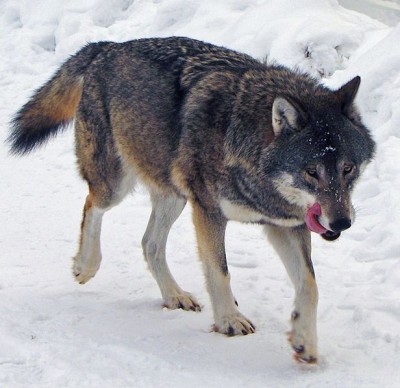Never have state wildlife officials registered so few predator attacks on Norway’s freely grazing livestock as in the past year. Hopes are rising that the new statistics may prompt reversal of a highly controversial order to kill off nearly two-thirds of the country’s recently re-built wolf population.

Wolves like this one in Sweden have crossed the border into Norway and established themselves in zones set aside by governments obligated to restore the wolf population. Now as many as 47 may be shot, to appease farmers who claim their free-grazing sheep are threatened, but new statistics show that predator attacks have reached a new low. PHOTO: Wikipedia Commons
Norwegian Broadcasting (NRK) reported on its nightly newscast Dagsrevyen Sunday that the number of registered attacks by wolves on sheep, for example, hasn’t been lower than for many years. The deadline for ranchers to report losses from predators during the summer’s open grazing season passed November 1, and state wildlife management officials at Statens naturforvaltning told NRK that the government will be handed another batch of numbers showing reductions in predator attacks.
Statens naturoppsyn, the state agency that actually carries out field work all over the country, reported last year as well that predators had killed just over 800 sheep in 2014 and 2015, down from 1,315 in 2009 and 1,279 in 2007. Wolves are far from the only predators involved, which also include wolverines, badgers, bears and eagles, for example. Just last week, a pack of dogs attacked and killed several sheep in Trøndelag.
It’s the wolves, however, that have been targeted for what environmentalists are calling a “mass slaughter” that has sparked criticism from all over the world. Norway’s wolf population, which has been built up over the past two decades after bordering on extinction, currently amounts to around 65 wolves. State authorities have gone along with ranchers’ demands for a wolf hunt this winter that can allow for up to 24 wolves to be shot within Norway’s established wolf zones, and as many as 47 wolves including those found outside the zones.
The order has been appealed, however, to the government minister in charge of climate and the environment. That post is currently held by Vidar Helgesen of the Conservative Party, who confirmed to Norwegian Broadcasting (NRK) over the weekend that new statistics from wildlife experts show “historically low losses” of sheep to the wolves.
Helgesen told NRK that the overall reduction in predator attacks in Norway “shows that the government’s (wildlife management) policies are working.” He noted, however, that another reduction in livestock losses won’t necessarily affect how he evaluates the current case. Instead, he told NRK, he’ll mostly base his verdict on the Parliament’s decision on how large the wolf population should be and on Norway’s international obligations.
Silje Lundberg, leader of the national environmental organization Naturvernforbundet, told NRK that Helgesen must take “the reality of the situation” into account. She claimed the low numbers of attacks on sheep confirm that the wolves do not pose such a huge threat to Norwegian livestock as the farmers claim.
Lundberg also claimed that shooting as many 47 wolves poses a bigger risk that more wolves from Sweden will wander into Norway, if fewer established packs exist. Such roaming wolves can have a tendency to attack livestock more often than established families of wolves do, Lundberg said.
newsinenglish.no/Nina Berglund


No comments:
Post a Comment